人教版英语必修三Unit 1 Festivals around the world语法情态动词课件(共29张)
文档属性
| 名称 | 人教版英语必修三Unit 1 Festivals around the world语法情态动词课件(共29张) |  | |
| 格式 | zip | ||
| 文件大小 | 15.3KB | ||
| 资源类型 | 教案 | ||
| 版本资源 | 人教版(新课程标准) | ||
| 科目 | 英语 | ||
| 更新时间 | 2019-05-25 08:22:08 | ||
图片预览



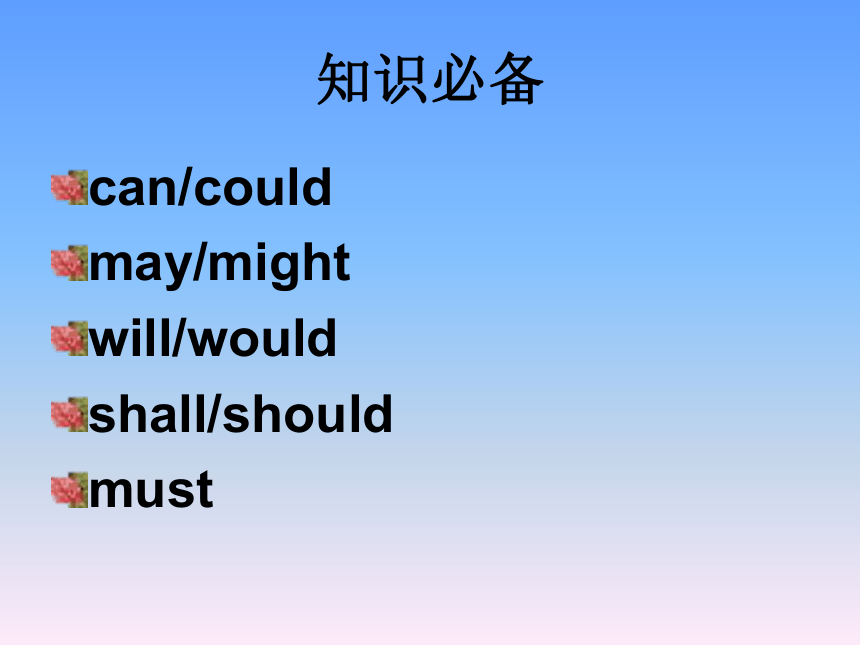
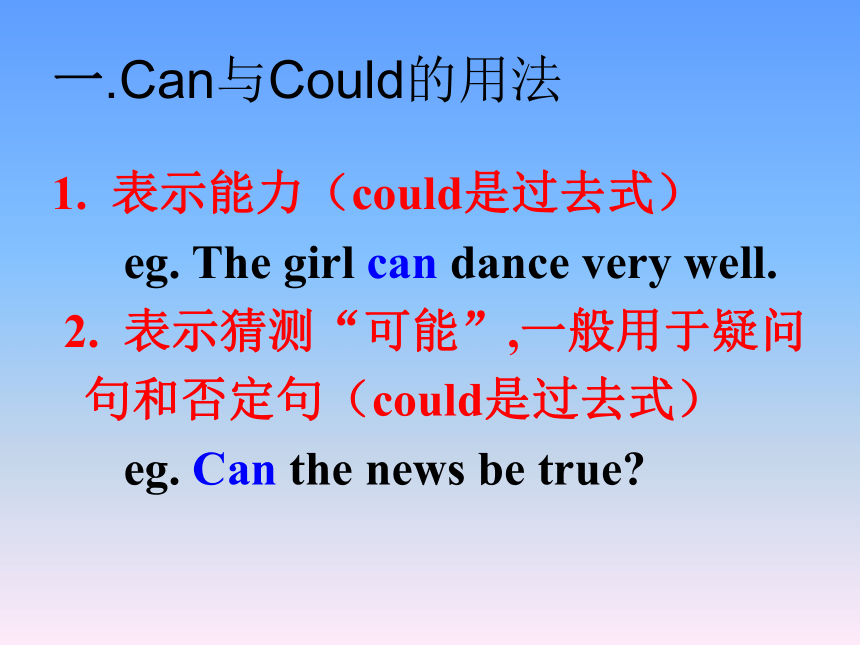
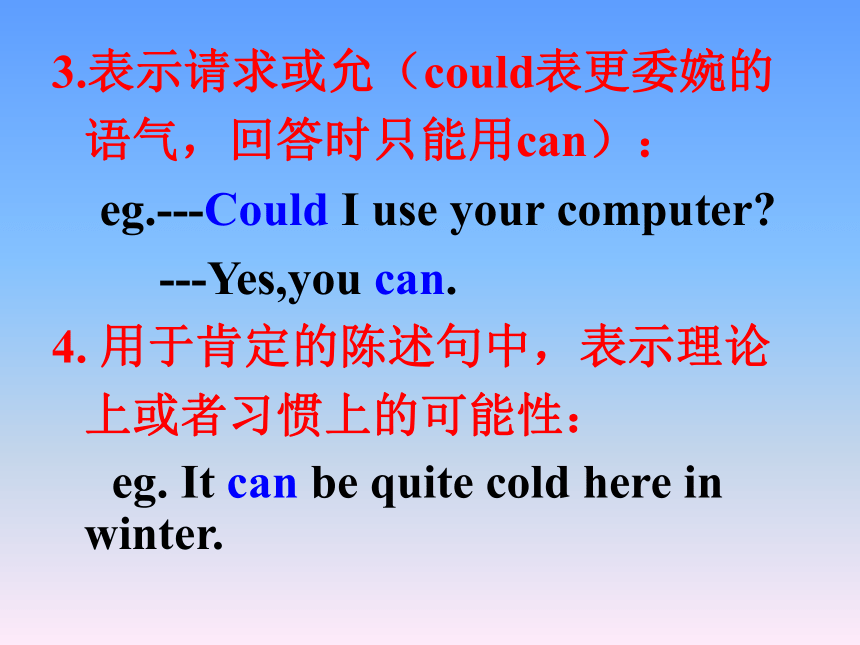
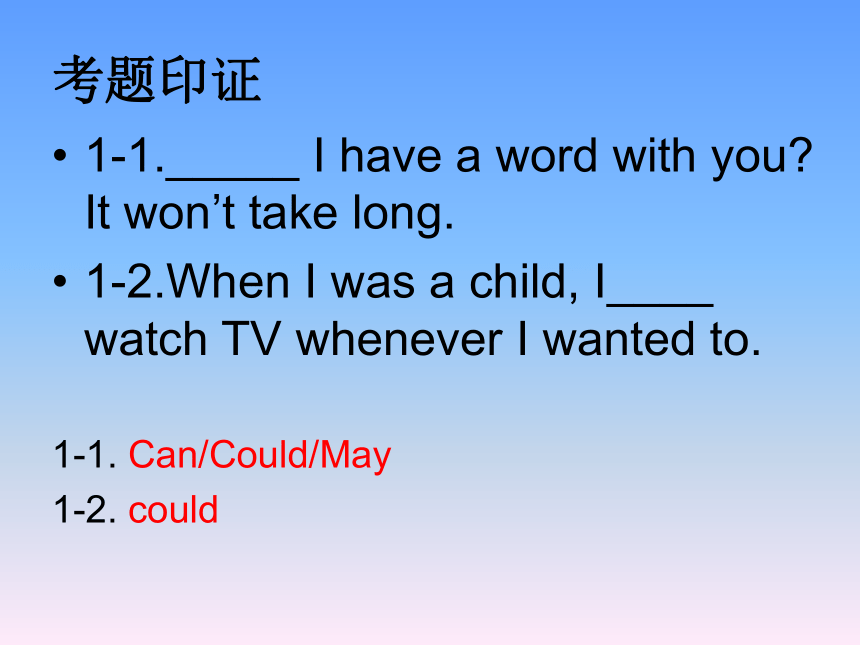
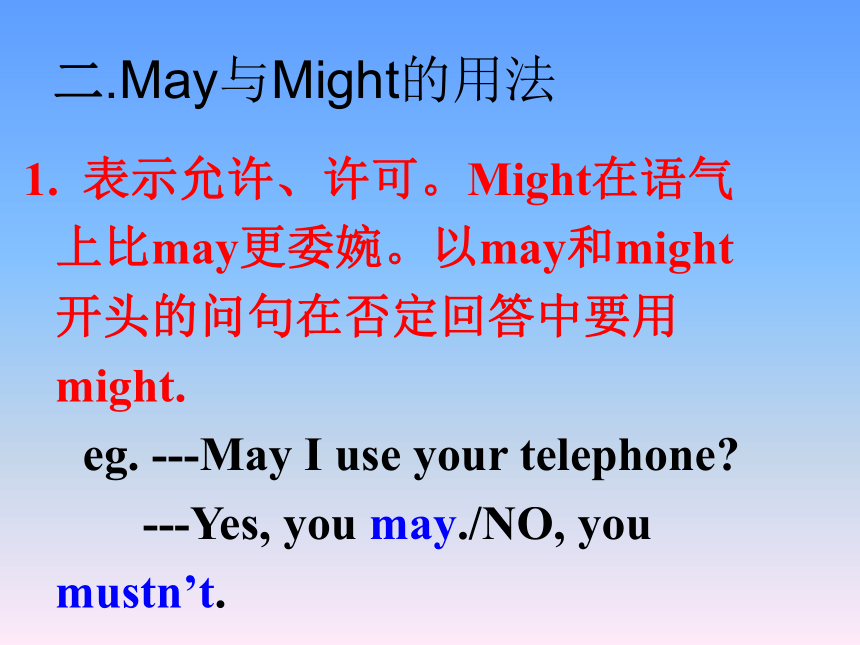
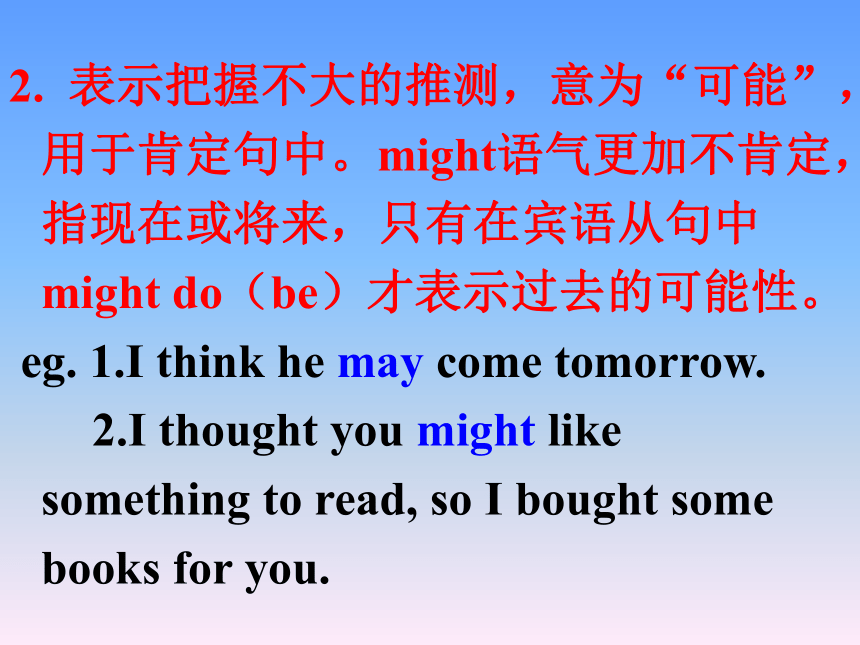
文档简介
课件29张PPT。Modal Verb I
情态动词什么是情态动词?情态动词表示说话人的某种感情或
语气,对某一动作或状态的某种态度。表示“需要、可以、必须、应当”等。情态动词的语法特征1. 情态动词不能单独做谓语,后接动词原形。(除ought to; have to外)
2. 情态动词没有人称,数的变化,但有些情态动词(如can, will)有一般式和过去式的变化。
知识必备can/could
may/might
will/would
shall/should
must
一.Can与Could的用法1.? 表示能力(could是过去式)
?eg. The girl can dance very well.
2.? 表示猜测“可能”,一般用于疑问句和否定句(could是过去式)
eg. Can the news be true?
3.表示请求或允(could表更委婉的语气,回答时只能用can):
eg.---Could I use your computer?
---Yes,you can.
4. 用于肯定的陈述句中,表示理论上或者习惯上的可能性:
eg. It can be quite cold here in winter.
考题印证1-1._____ I have a word with you? It won’t take long.
1-2.When I was a child, I____ watch TV whenever I wanted to.
1-1. Can/Could/May
1-2. could
二.May与Might的用法1.? 表示允许、许可。Might在语气上比may更委婉。以may和might开头的问句在否定回答中要用might.
eg.?---May I use your telephone?
---Yes, you may./NO, you mustn’t. 2.? 表示把握不大的推测,意为“可能”,用于肯定句中。might语气更加不肯定,指现在或将来,只有在宾语从句中might do(be)才表示过去的可能性。
eg. 1.I think he may come tomorrow.
2.I thought you might like something to read, so I bought some books for you.3. May 用于祈使句表示祝愿。
eg. May you succeed!
May you have a good journey!
考题印证2-1.Life is unpredictable; even the poorest____ become the richest.
2-2---____ I take the books out?
--- I’m afraid not.
2-1. might/may
2-2. May/Can/Could
三.Will与Would的用法 will/would 是助动词还是情态动词?
will 构成将来时-----助动词。
表示“意志”“决心”“请求”---情态动词。
I will tell you something important.
我要告诉你一件重要的事情。(助动词)?
Will you tell her that I'm here?
请您告诉她说我在这儿,好吗?(情态动词) ?
1.?表示意志、意愿和决心,用于各种人称(will 指现在,would指过去)
eg. 1. Hari promised me he would not sleep in class.
2. Please give me another chance, I will never do that again.
2.?表示请求、建议等,用于第二人称
(用would比will委婉)
eg. 1.Will you please take a message for him?
2. Would you please tell me your telephone number?
3.表示习惯或倾向,意为“总是”,“习惯于”。
eg. 1.Fish will die without water.
2. People will talk. (人们总会说闲话。)
4.用于否定句,表示“不肯;不乐意”
eg. No matter what I said, he wouldn’t listen to me.
考题印证I still remember my happy childhood when my mother____
take to me to Disneyland at weekends.
would
四.Shall与Should的用法1.?shall 用于第一、第三人称的疑问句中,表示说话人征求对方的意见或向对方请示。
?eg. What shall we do this evening?
2.?shall 用于第二、第三人称,表示说话人给对方命令、警告、允诺或威胁。
eg.1.You shall fail if you don’t work hard.(警告)
2.You shall not leave your post.(命令)
3.?should表示劝告或建议,意思是“应该”;还可以表示可能性或惊讶。
eg. You should go to classroom right now. 考题印证4-1.It was sad to me that they, so poor themselves,____ bring me food.
4-2.One of our rules is that every student____ wear school uniform while at school.
4-1. should
4-2. shall
五. Must的用法1.?表示“必须”,语气比should,ought to强烈。其否定形式为“mustn’t”(不准,禁止)
?eg. You must practise your spoken English if you want to improve.
点津:
以must开头的一般疑问句的肯定回答中 must,否定回答中要用needn’t/don’t have to.
eg:---Must I finish my paper today?
---Yes,you must./No,you needn’t.2.?表示有把握的肯定推测,只能用在肯定句中,意思是“一定;准是”,在否定句、疑问句中要用can’t代替。
eg. He must be working in his office.3. 表示感彩,意为“偏偏;偏要”常指令人不快的事情。
eg: The car must break down just when I was about to start.考题印证5-1.Harry is feeling terrible.He_____ have drunk too much at the party last night.
5-2.---_____ you interrupt now?Can’t you see I’m on the phone.
---Sorry Sir, but it’s urgent.
5-1. must
5-2. Must
Exercise翻译句子
1.这个故事不可能是真的。(can)
The story can’t be true.
2.她说他可以骑她的自行车(might)
She said that he might ride her bike.
3. 请您告诉她我在这儿,好吗?(will)
Will you tell her that I’m here?
4. 她本应该通过考试的。(should)
She should have passed the exam.
5.严禁在办公室吸烟。
Smoking must not be allowed in the office.Thank You!
语气,对某一动作或状态的某种态度。表示“需要、可以、必须、应当”等。情态动词的语法特征1. 情态动词不能单独做谓语,后接动词原形。(除ought to; have to外)
2. 情态动词没有人称,数的变化,但有些情态动词(如can, will)有一般式和过去式的变化。
知识必备can/could
may/might
will/would
shall/should
must
一.Can与Could的用法1.? 表示能力(could是过去式)
?eg. The girl can dance very well.
2.? 表示猜测“可能”,一般用于疑问句和否定句(could是过去式)
eg. Can the news be true?
3.表示请求或允(could表更委婉的语气,回答时只能用can):
eg.---Could I use your computer?
---Yes,you can.
4. 用于肯定的陈述句中,表示理论上或者习惯上的可能性:
eg. It can be quite cold here in winter.
考题印证1-1._____ I have a word with you? It won’t take long.
1-2.When I was a child, I____ watch TV whenever I wanted to.
1-1. Can/Could/May
1-2. could
二.May与Might的用法1.? 表示允许、许可。Might在语气上比may更委婉。以may和might开头的问句在否定回答中要用might.
eg.?---May I use your telephone?
---Yes, you may./NO, you mustn’t. 2.? 表示把握不大的推测,意为“可能”,用于肯定句中。might语气更加不肯定,指现在或将来,只有在宾语从句中might do(be)才表示过去的可能性。
eg. 1.I think he may come tomorrow.
2.I thought you might like something to read, so I bought some books for you.3. May 用于祈使句表示祝愿。
eg. May you succeed!
May you have a good journey!
考题印证2-1.Life is unpredictable; even the poorest____ become the richest.
2-2---____ I take the books out?
--- I’m afraid not.
2-1. might/may
2-2. May/Can/Could
三.Will与Would的用法 will/would 是助动词还是情态动词?
will 构成将来时-----助动词。
表示“意志”“决心”“请求”---情态动词。
I will tell you something important.
我要告诉你一件重要的事情。(助动词)?
Will you tell her that I'm here?
请您告诉她说我在这儿,好吗?(情态动词) ?
1.?表示意志、意愿和决心,用于各种人称(will 指现在,would指过去)
eg. 1. Hari promised me he would not sleep in class.
2. Please give me another chance, I will never do that again.
2.?表示请求、建议等,用于第二人称
(用would比will委婉)
eg. 1.Will you please take a message for him?
2. Would you please tell me your telephone number?
3.表示习惯或倾向,意为“总是”,“习惯于”。
eg. 1.Fish will die without water.
2. People will talk. (人们总会说闲话。)
4.用于否定句,表示“不肯;不乐意”
eg. No matter what I said, he wouldn’t listen to me.
考题印证I still remember my happy childhood when my mother____
take to me to Disneyland at weekends.
would
四.Shall与Should的用法1.?shall 用于第一、第三人称的疑问句中,表示说话人征求对方的意见或向对方请示。
?eg. What shall we do this evening?
2.?shall 用于第二、第三人称,表示说话人给对方命令、警告、允诺或威胁。
eg.1.You shall fail if you don’t work hard.(警告)
2.You shall not leave your post.(命令)
3.?should表示劝告或建议,意思是“应该”;还可以表示可能性或惊讶。
eg. You should go to classroom right now. 考题印证4-1.It was sad to me that they, so poor themselves,____ bring me food.
4-2.One of our rules is that every student____ wear school uniform while at school.
4-1. should
4-2. shall
五. Must的用法1.?表示“必须”,语气比should,ought to强烈。其否定形式为“mustn’t”(不准,禁止)
?eg. You must practise your spoken English if you want to improve.
点津:
以must开头的一般疑问句的肯定回答中 must,否定回答中要用needn’t/don’t have to.
eg:---Must I finish my paper today?
---Yes,you must./No,you needn’t.2.?表示有把握的肯定推测,只能用在肯定句中,意思是“一定;准是”,在否定句、疑问句中要用can’t代替。
eg. He must be working in his office.3. 表示感彩,意为“偏偏;偏要”常指令人不快的事情。
eg: The car must break down just when I was about to start.考题印证5-1.Harry is feeling terrible.He_____ have drunk too much at the party last night.
5-2.---_____ you interrupt now?Can’t you see I’m on the phone.
---Sorry Sir, but it’s urgent.
5-1. must
5-2. Must
Exercise翻译句子
1.这个故事不可能是真的。(can)
The story can’t be true.
2.她说他可以骑她的自行车(might)
She said that he might ride her bike.
3. 请您告诉她我在这儿,好吗?(will)
Will you tell her that I’m here?
4. 她本应该通过考试的。(should)
She should have passed the exam.
5.严禁在办公室吸烟。
Smoking must not be allowed in the office.Thank You!
同课章节目录
